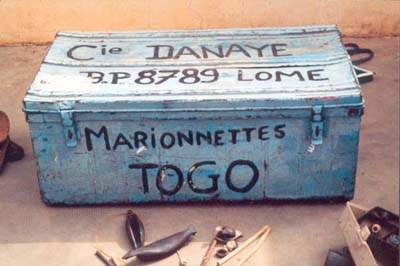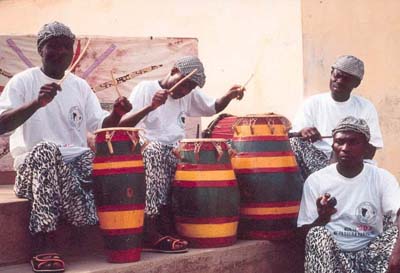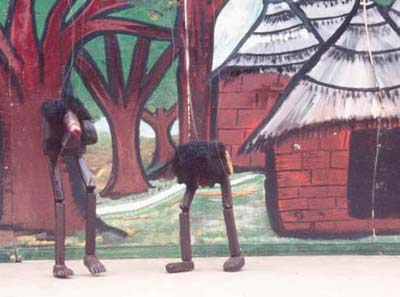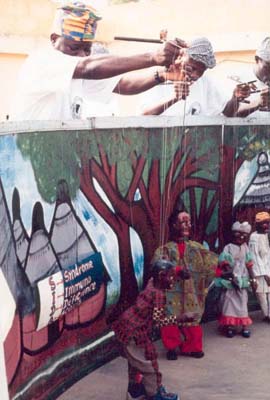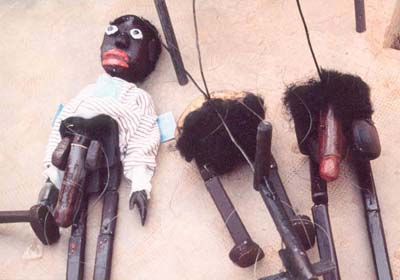"Aids? If only I had known!" Puppetry against aids in Togo
by Elisabeth den Otter
A puppet-show is an excellent medium with which to give guidance, in a playful way, about a delicate subject like aids. By means of simple wooden string puppets the players of the 'Compagnie Danaye' from Togo tell traditional stories, but also give information about contemporary matters. The play "Aids! If only I had known!" was written by Danaye together with the Togolese Association of Women against Aids. Because the message is presented in such a light way, it appeals to young and old people.
The Togolese puppet-player Danaye (his name means: "Do not compare yourself with others") learned to play the puppets in Europe, but his inspiration comes from his own background: He is a Gourmantche-Moba from Northern-Togo. Danaye tries in his own way to combine the European and the African puppet-play. The characters are therefore rather diverging: from catholic priests, to European development workers, to African people and ghosts. Because of the difficult political and economical situation in Togo it is not easy for him. One of the sayings he often uses is: "If all goes well, the government is honoured, but if things go wrong, I get blamed!" He often loses his patience and enters an open struggle with people he does not esteem, although they are sometimes in high places. But he keeps his good humour and isn't easily disheartened. He is a born leader, who cares a lot about puppet-play, puppet-players and musicians. He teaches them and supports them financially as much as possible. In total there are about fifteen people, who perform in different combinations. Thus it is possible that one group is on tour in Europe, while another group is performing in Togo. Most of them also have other job to make ends meet.
The puppets are sacred, in the eyes of Danaye, because they resemble the figures which represent the ghosts of the ancestors (tchitchilik). In both cases sacred wood is used. Ghosts also appear in his plays. He puts it like this: "We are connected to God with invisible threads", and: "We all are somebody's puppet".
The string puppets, that are used in the play about aids, are made by Danaye and his group, just like the music-instruments and the backdrops. Practically all of the members of the group play musical instruments: before the play, to accompany singing, or as sound effects. For that purpose three drums, a number of metal percussion-instruments (cowbell, rattle, etc.), a mouth harmonica and a flute are used. All members of the society sing, and the language is adapted to the region where they are performing. During certain scenes songs about aids by famous singers such as Franco (from Zaire) are played by means of a cassette recorder.
The play
The story consists of six scenes. In the first scene a legend is told about the origin of sexually transmitted diseases.
God first made Thing (= the female genitals) , and after that Affair with his two Assistants (= the male genitals) and sent them to earth. They lived together as friends. When they got hungry they decided to collect oil-nuts. Affair collected the nuts and gave a part of them to Thing; the assistants immediately ate their share. Then it started to rain, and Thing presented herself as a hiding-place. Affair was allowed to enter, but the helpers had to stay outside. Each time it started to rain Affair entered Thing. That is why more and more Things and Affairs came. From that moment on more and more sexually transmittable diseases, among them aids, developed.
In the following scenes the Professor explains what aids is, how it is caused (the HIV virus), and how it is transmitted. Not by animals (monkeys, mosquitoes), not by living with an aids patient in the same house or by touching him or her, but by unprotected sexual contact with an infected person, a transfusion with contagious blood, or the use of instruments which are contaminated, like razors and syringes. Pregnant women who are infected may pass on the disease to their unborn child. How can you see that someone has aids ? He gets skinny, has fever and diarrhoea, is very tired and coughs a lot. But luckily you are aware of the plague that threatens us. What does it mean if somebody is seropositive? That he is a carrier of the HIV virus. It can take months or even years until he will get the symptoms of the illness, but he can pass it on to others. Can aids be cured? No, it is a fatal disease, but you can arm yourself against it. Traditional African healers say that they can cure the disease, but that is not true.
How can we avoid contracting aids ? Only by having safe sexual contact and by being faithful to each other. If you want to make love to prostitutes you have to wear a condom. Take precautionary measures!The audience is shocked, but one of those present, Yao, says that he does not believe anything and that he will simply go on with the life he is leading. He is going to the bar 'My Foot, Your Foot' to meet his lover there.
In the bar 'My Foot, Your Foot' Yao and the others joke about aids, and say that it is an invention of the whites to frighten them, subdue them, but especially to keep them from making love, because they themselves are not able to do it well. SIDA does not mean "Syndrome Immuno Deficience Acquis", but "Syndrome Imaginaire pour Décourager les Amoureux" (Imaginary Syndrome to Discourage Lovers")… Essi, a prostitute, complains that she will have less work now; men do not like to use a condom. They drink and dance. Essi is pregnant and has been coughing for months. Her husband died as a result of diarrhoea. She falls down unconscious and is taken to the hospital, where she dies. The others are given a warning: They should get tested.
Yao and his girlfriend Kafui are seropositive. The Professor explains that seropositives may live for a long time if they take care of themselves. They devote themselves to the good cause and inform people about the danger of aids. Yao and Kafui tell people at the bar about aids and how to avoid it. Aids! If only I had known! Affair wants to make love to Kafui, who tells him that he has to use a condom: Aids will not spread itself through me. No love without a condom!
Thus, Danaye and his group tell traditional old stories by means of puppet-shows, but they also criticise the current situation and inform people about aids. In this way the present and the past are depicted and information is passed on.
More about puppetry
